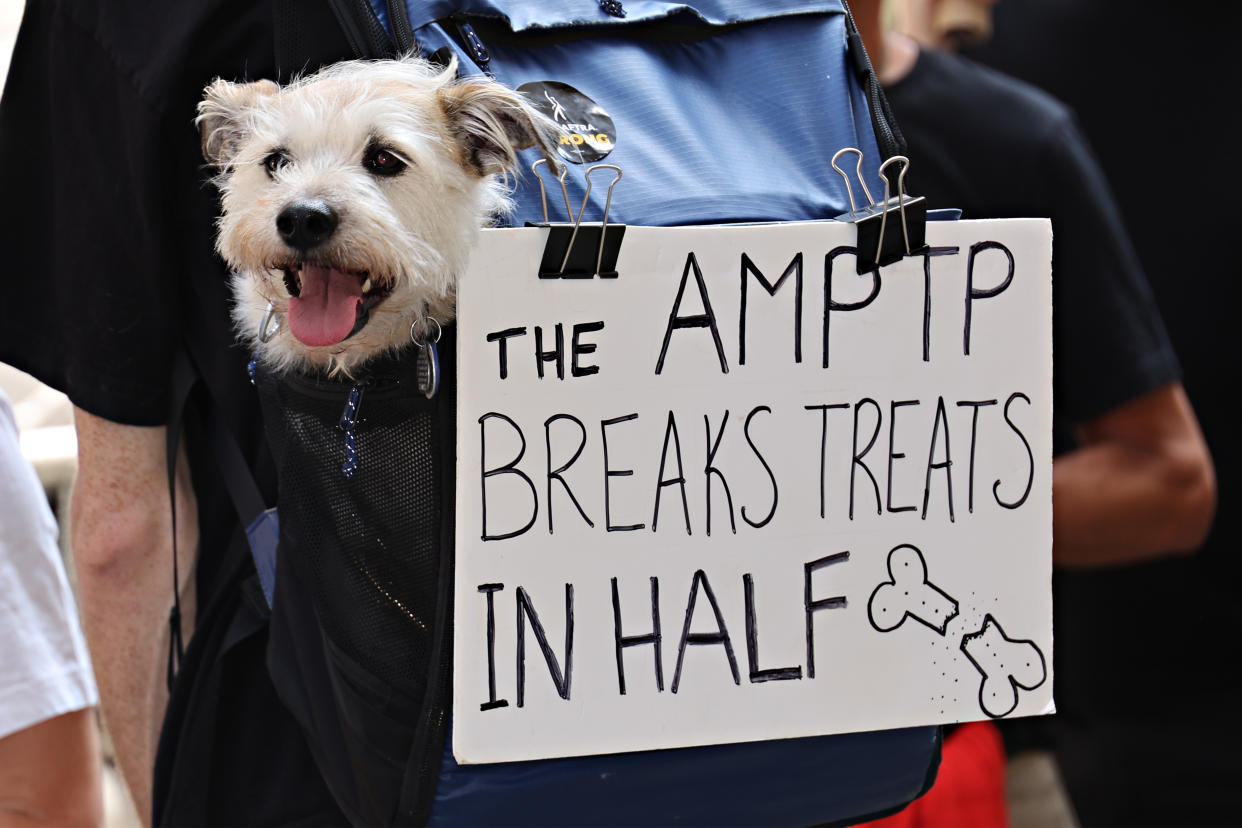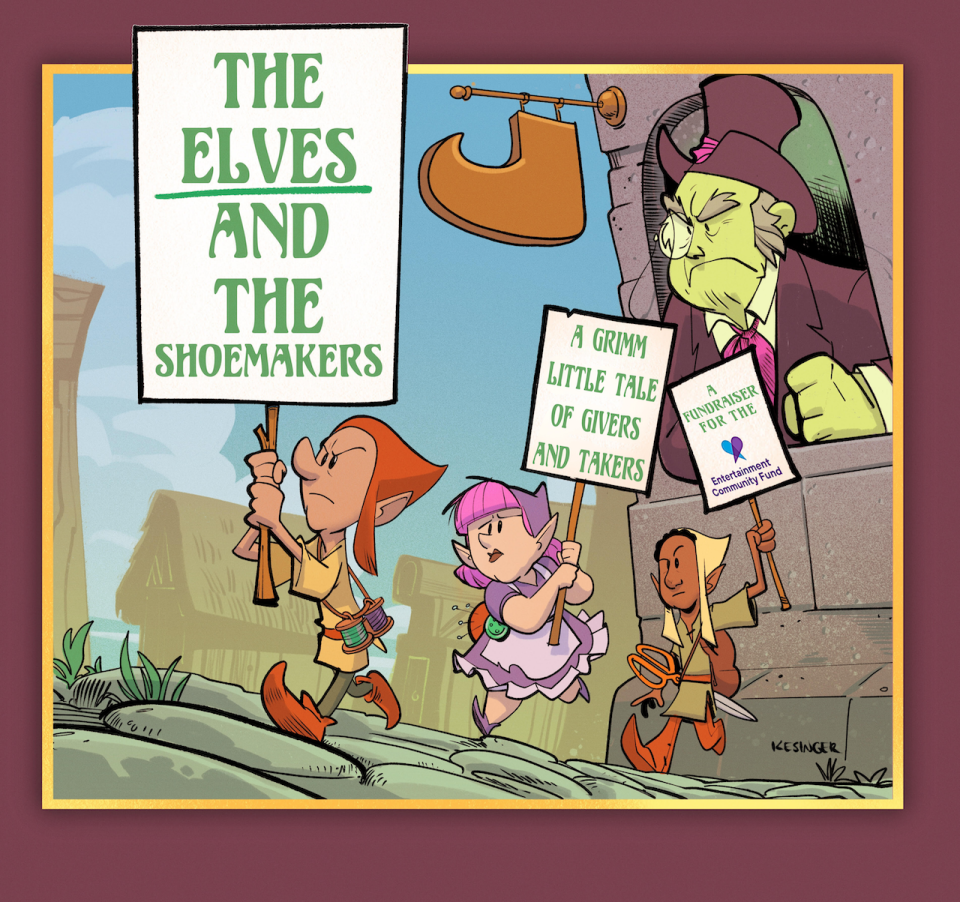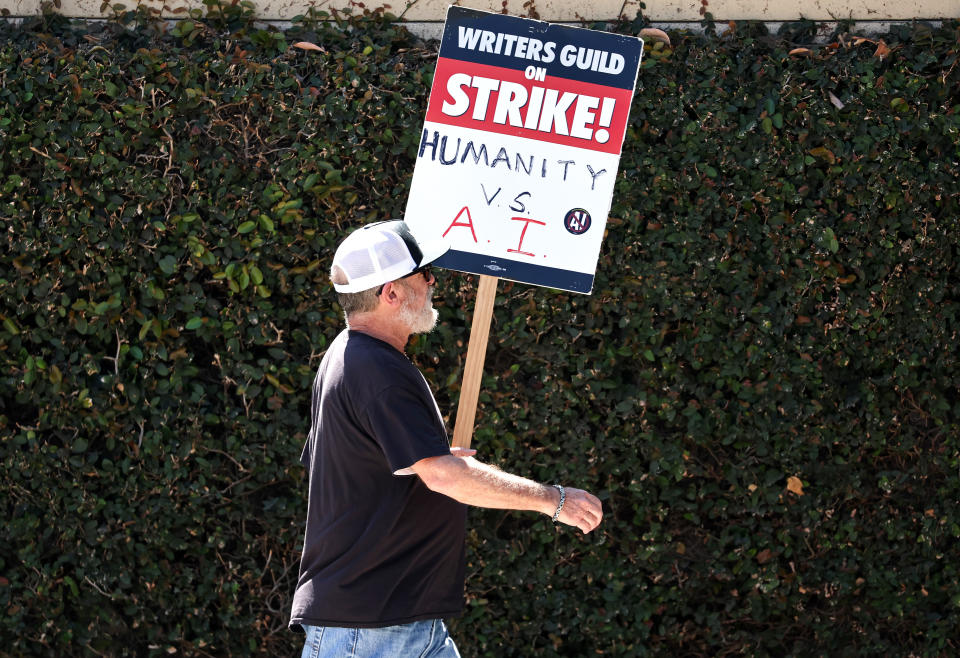WGA Members Wrote a Children’s Book to Explain the Writers Strike to Their Kids

Two WGA writers have most certainly not put their pencils down during the now-129-day strike against Hollywood studios. It is not against the guild’s rules to pen a… children’s book — especially one about the fight with the AMPTP.
Peter Cameron (“Moon Knight,” “Carnival Row”) is the lead writer on “The Elves and the Shoemakers: a Grimm Little Tale of Givers and Takers.” He’s also a father who has struggled to find the right way to explain the strike to his 3-year-old son. So Cameron, whose dream “has always been” to write children’s books come retirement time (think more Roald Dahl than Dr. Seuss), dusted off his typewriter.
More from IndieWire
WGA Willing to Make a Deal with Individual Studios Outside of AMPTP
Tiffany Haddish Claims She Was 'Never Paid' for First Movie: I Didn't 'Get a Dime'
The picture book, a sequel to the Brothers Grimm’s “The Elves and the Shoemaker,” was co-written by a second WGA member with what Cameron called “priceless input” from a third. They prefer to remain anonymous; together, the group goes by “the elves.”
There are “honorary elves” as well, including the book’s illustrator Brian Kesinger (“Tarzan,” “Frozen II”) and fellow WGA writer Laura Monti (“WandaVision,” Marvel’s upcoming “Agatha: Coven of Chaos”), who is handling press outreach. And then there are the names who have already publicly supported the project, including Jamie Lee Curtis (a longtime children’s author herself) and Tony Cavalero (“The Righteous Gemstones”).
“The Elves and the Shoemakers: a Grimm Little Tale of Givers and Takers” is fully written; art is a work in progress, it aims to be finished in December. All profits from the book will be donated to the Entertainment Community Fund.
The elves’ campaign, which aims to raise the financing to finish the book, is live on Indiegogo. As of this writing, $3,815 has been raised; the listed goal is $10,000, which Cameron said is “the least amount of money that made sense for the work that it would take.”
In terms of charity, they’re already in the black. About one-third of the $10,000 is to cover production cost; the other two-thirds would be donated to the fund.
While it may be better to give, Cameron and the elves have also received from the process. Nowhere more so than in the “sanity” department.
“The project itself has just been both a real community gut-check — in a lovely way — and a place of sanity, weirdly,” Cameron told IndieWire. “Marching endless circles around a studio lot where you know the executives that you are actively protesting against — and their decision making and their thinking — are literally not in the buildings. After a couple of weeks, although it is so important to show up and be a physical presence, it’s hard to find active motivation beyond your own ideals.”
Really, it’s just “hard not to drive yourself crazy with that thought,” he said.

The original “Elves and the Shoemaker” is a short, sweet tale from the 1800s about collaboration; a down-and-out shoemaker sees his business saved by mysterious helpers. Cameron’s version presupposes that the Grimm’s Shoemaker got all too comfortable having those elves around to do his work. The cheap labor turned the Shoemaker from grateful to greedy.
Cameron’s now-evil Shoemaker has “a dream of becoming stinkin’ rich.” His helpful Elves “infuse every stitch with a small piece of their hearts.” (Stop us when this all starts to sound familiar.)
“Things are going pretty good and why would he want anything to change? It’s the perfect system and he helped create it — it’s all, sadly, pretty analogous to real life,” Cameron said.
Also analogous to real life is the Shoemaker’s dialogue in “The Elves and the Shoemakers: a Grimm Little Tale of Givers and Takers.” About 20 percent of what comes out of the antagonist’s mouth are actual quotes uttered by real studio executives during the WGA strike — you know, before crisis PR intervened.
In this version, the Elves take a stand against the mistreatment. When the Shoemaker won’t give up the cheese (get it? money), the Elves protest his shop. Without his workers, the Shoemaker turns to the Cobbl-O-Matic, a machine that promises to manufacture shoes 10 million-times faster than any elf, and at a fraction of the price too. Yeah, that’s the AI here.
As is tradition in children’s books, “Givers and Takers” has a happy ending. The Shoemaker comes to realize that these shoes “have no sole,” per Monti’s press release. It then asks: “Will the Shoemaker swallow his pride and learn to respect the Elves? Or will his greed get the better of him?”
In real life, we’re all still waiting to find out. Though Cameron has a prediction: “I do think ultimately that good will prevail.”
The Writers Guild of America has been picketing the Alliance of Motion Picture and Television Producers since May 2. The two sides are pretty far apart on the issues of AI, streaming residuals, and staffing minimums for writers’ rooms.

Below is an excerpt from “The Elves and the Shoemakers: a Grimm Little Tale of Givers and Takers,” provided to IndieWire.
——————————————-
The Elf who’d piped up had much more to say, but found it intimidating to confront a giant. So he pretended to be brave, so much so that he was:
“We love making shoes,
though we can’t help but wonder…
Why your tide is rising
while we’re going under.”
“How dare! Did I not put clothes on your backs!” bellowed the Shoemaker.
The Elf cowered in response, fiddling with the clasp on his overalls. But a second Elf was right behind him, eager to find the right words.
“We’re grateful for these get-ups,
and we do aim to please,
but we can’t sustain your set-up
without a slice of–
“If you say profits I will squish you with a summer sandal!” The Shoemaker slammed the table so hard that — right there and then — the elves invented tap dancing just to stay on their feet.
Another Elf grabbed a pudding spoon for balance and squeaked,
“Our first ask was for cheese,
Since our crumbs have grown spare.
But without our expertise?
Your whole shop would be bare!”
To this, the Shoemaker hunched over his table, until he was nose-to-nose with the growing disturbance. “You impudent imps. You like rhymes? Here’s one for you:
What you do isn’t work, you make shoes for enjoyment;
Thanks to me, you are lucky to have term employment.”
Best of IndieWire
Nicolas Winding Refn's Favorite Films: 37 Movies the Director Wants You to See
The Best LGBTQ Movies and TV Shows Streaming on Netflix Right Now
Unsimulated Sex Scenes in Film: 'Nymphomaniac,' 'Brown Bunny,' 'Little Ashes,' and More
Sign up for Indiewire's Newsletter. For the latest news, follow us on Facebook, Twitter, and Instagram.


